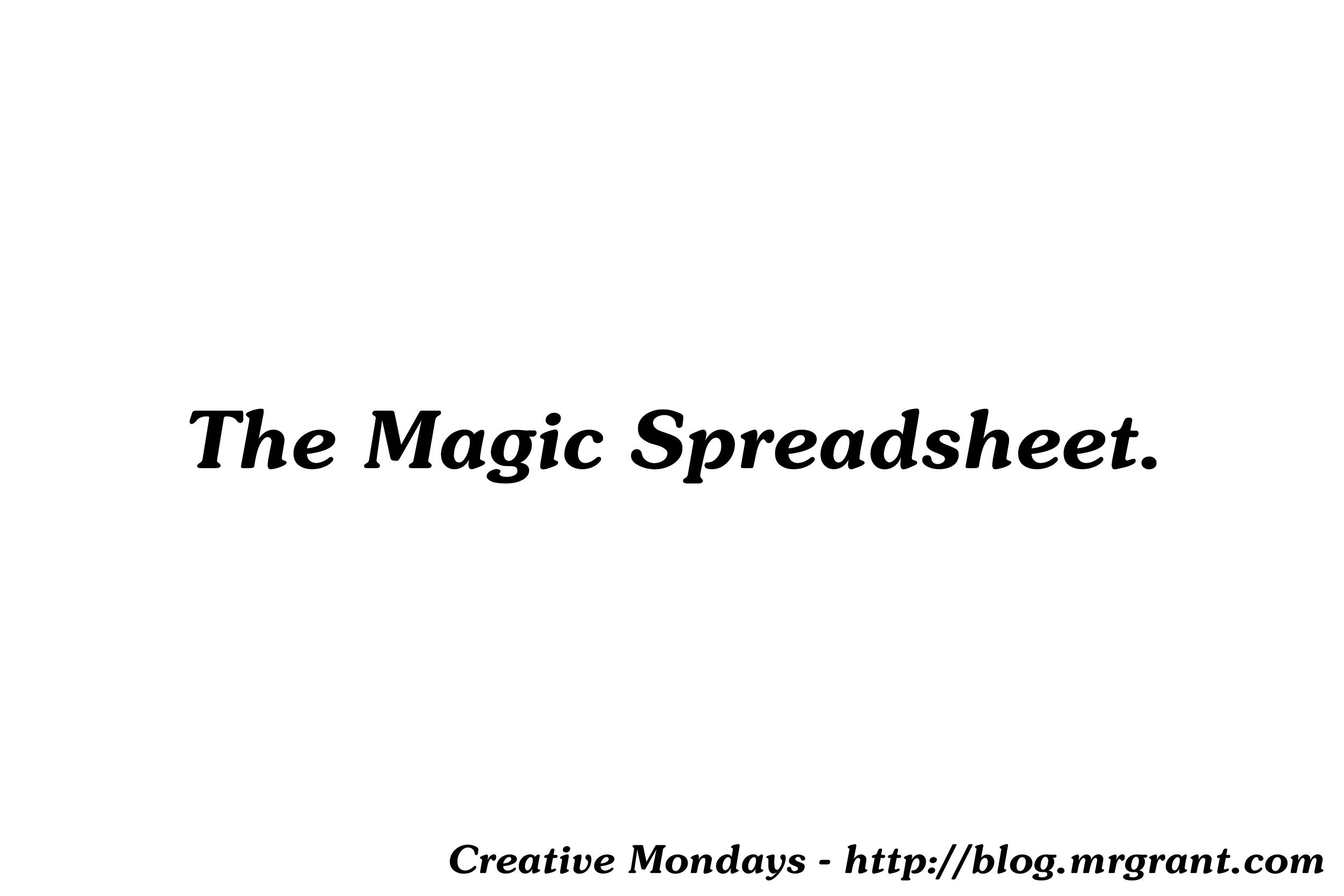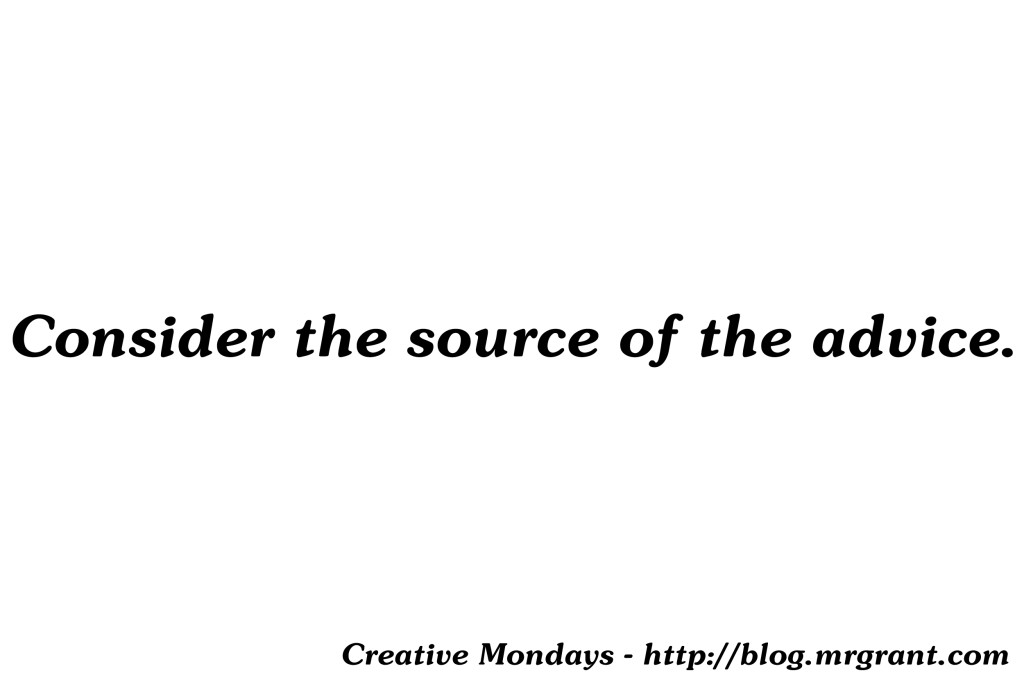Tag: screenwriting
Creative Mondays #014 – The Magic Spreadsheet

Back toward the end of 2012, I heard about a thing called ‘The Magic Spreadsheet.’ I heard about it on Mur Lafferty’s podcast I SHOULD BE WRITING which is a podcast that, if you have any sort of passion for writing, you should be listening to. Mur Rocks. Anyway, she spoke about how the Magic Spreadsheet had helped her write more than any other tool or practice she had found.
In a nutshell, The Magic Spreadsheet, created by a colleague of Mur’s names Tony Pisculli, is a simple tool that helps you get into the practice of writing everyday. The starting goal is 250 words per day. Roughly one page of typed text. It should take you about 15 minutes. On the first day you write 250 words you enter that number on the Magic Spreadsheet and you get one point. Now the next day if you write 250 words and you enter in that number, you get one point for writing 25 words and then another point because you’ve created a link in your chain by writing two days in a row. The next day you would get one point for the 250 words and TWO points for two links in a chain and so on. There’s more ways to earn points, but those are the basics.
Since I discovered The Magic Spreadsheet, I have written consistently, only missing one day when I was in the backwoods of Oregon and realized after being in bed for 20 minutes that I’d forgotten to write. Despite that small break in my chain, I have written a total of 122,885* words and, except for that day mentioned earlier, have written every single day since. It has been the most consistent I’ve been at writing and working on my writing and I have turned out a lot of words. Not all of those words were fantastic, but it doesn’t matter as much as the learning of the discipline of sitting and writing.
Now I know you may be asking, “So…you get points? That’s it?” And the answer is, yes. That’s it. There are leader boards where you can see how your word count of chain length compares against others, so there is a small ‘competitive’ factor that can play into it. Outside of that however, you don’t ‘get’ anything. I will say that it really works for me.
Everyday I have it in my head, “I have to do my words. I can’t break my chain (again).” And when the day is done, I have done my words. I have even been pushing myself to do more than the 250 words, usually going over 500. Somedays it’s very, very hard to get the words done. I lack energy to do them, I feel I have no good ideas to put down on paper or eleven other excuses pop into my head, but I get them done because I don’t want to break my chain again.
The other thing about The Magic Spreadsheet is if you, unfortunately, miss a day…nothing happens. You just start back up the next day and, if you’re like me, you will be doubly set on not breaking that chain again.
Now The Magic Spreadsheet may not be your thing or it may not work for you’re art and that’s fine. But you can do something similiar. Make a goal for yourself to do something creative everyday. Something easily obtainable (250 words a day, 10 sketches, 20 minutes of instrument practice, etc.) and then give yourself a point, or an X on a calandar, or a gold star each day you do it. After a week or so of practicing this, you may just get into the groove of doing so and you’ll keep up your creative habit because you want to get those points or x’s or gold stars.
—
What motivation tools do you use to motivate you to get things done?
*This post was written some month ago. Despite a few more breaks in the chain, as of February 28, 2014, I have written a total of 282,248 words. All thanks to The Magic Spreadsheet.
Creative Mondays #013 – Consider the source of the advice.

I talked earlier in this blog about keeping your plans secret. Don’t tell others what you are doing because they will taint your ideas with phrases like, “You know what you should do instead?” But, there are times in your creative career where you will solicit advice from others. That is perfectly fine as long as you keep one thing crystal clear in your head: consider the source.
We started working on Dr. Floyd way back in 1999. It wasn’t a podcast back then, it was a public access TV show. Even though we were limited by the technology of the time, the whole creative world seemed wide open in terms of what we were able to do. While we were working on the show I began cobbling together a script for what, I dreamed someday, would become a Dr. Floyd feature film. Look, it’s Hollywood, everyone has a script in a drawer somewhere.
Before it was finished I gave it to someone to read and this person came back telling me that I didn’t write the script properly. Not in that it was formatted incorrectly, but that I was “being too descriptive in the details” and that I was, “writing out things that should be left up to the director.” Hearing this bummed me out and I never finished the script because I felt I was doing it all wrong.
Years later, I was thinking about that script and about what that person had said and then I realized that the person who gave me that advice had written a script but never had one produced (outside of doing it for himself). So, what right did he have to tell me I was doing something right or wrong when he’s never done it himself? How did he know I was adding details that would be left up to the director?
Consider the source.
If you’re trying to do something and you get advice, consider who is giving you that advice. If you’re trying to publish a book, is the person giving you advice a published author? If you’re trying to get your first art showing, is the person giving you the advice and artist who has had gallery showings before? If you’re writing a script and someone who has never had a script produced is telling you you’re doing it wrong, should you listen to them? No.
Now, the flip side to that is that if the person HAS done what you want to do, listen to their advice.
I wrote a novella a few years ago and a friend of mine, who is a published author, graciously offered to read it. This person then pointed out several things that could be changed to make the novella read better and I took that person’s advice because they had done what I want to do.
Consider the source. Who is giving you this advice? Have the done what you’re trying to do?
In the end, it is up to you to take ANY advice you are given. Whether it be from someone who has done what you’re trying to do or someone who hasn’t. Only take the advice if it feels right for you and what you are working on.
—
Do you consider the source when getting advice? Has someone with no experience in what you are trying to do ever given you advice that derailed you creative goals? How did you deal with it? Let me know in the comments below!